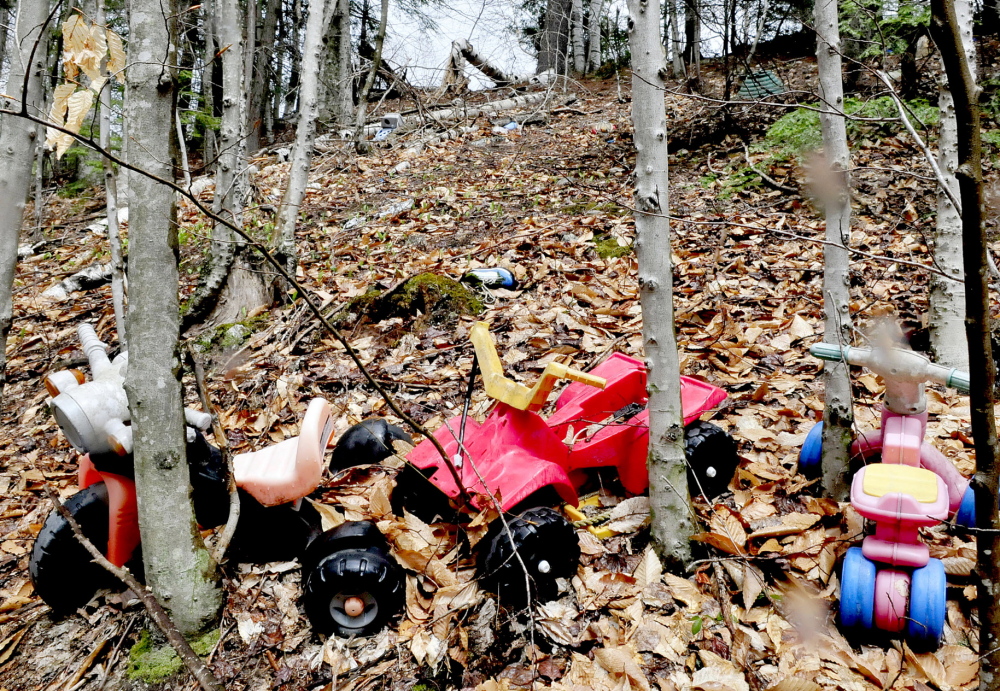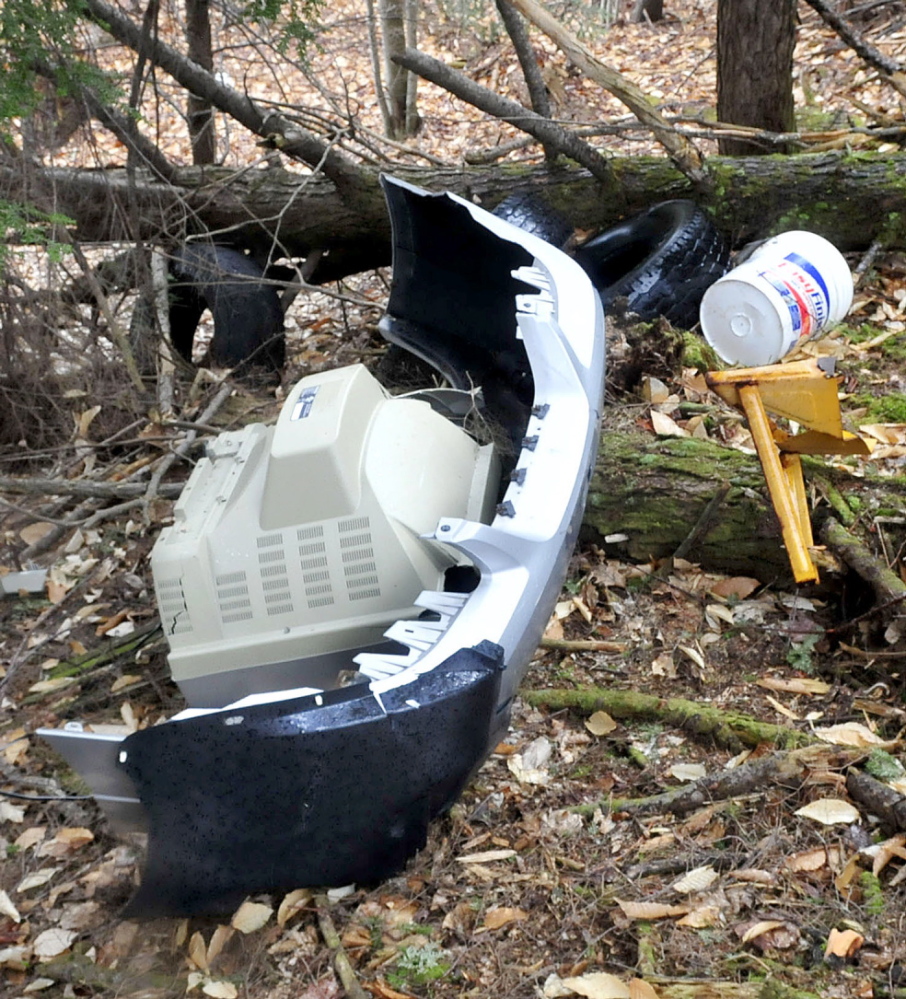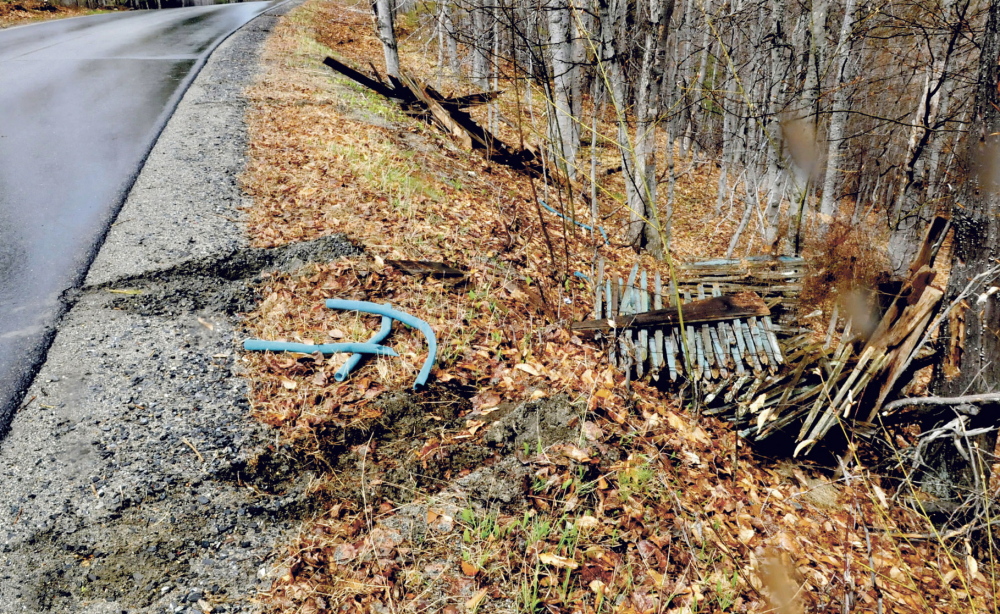Everyone in central Maine can agree that trash dumping in the woods is a problem, but officials from different towns disagree on how to make it stop.
Sometimes called midnight dumping or fly dumping, the throwing of tires, appliances and other sorts of trash creates large expenses and safety issues for the public.
Towns such as Belgrade and Greene have new systems that make it easier and cheaper for residents to throw out bulky items at their transfer stations. Town officials think that with fewer barriers, more people will dispose of their waste legally.
But other communities report that a comparatively restrictive pay-as-you-throw system, in which consumers are charged for every bag of trash they generate, works and has not caused a predicted increase in illegal dumping.
Waterville’s City Council recently approved pay-as-you-throw on a 5-2 vote, based in part on reports of the program’s successes in Brewer, Sanford and Presque Isle.
Maine is different from many other states in that there have been no significant regional or statewide efforts to study or address illegal dumping, leaving communities to come up with their own, sometimes very different, solutions to the same problem.
The conventional wisdom is that the cost of disposing of a bag of trash legally has a lot to do with whether that bag will end up in the woods.
Matt Gomes, a ranger with the Forest Protection Division of the Maine Forest Service, has prosecuted hundreds of people for illegally dumping tires, appliances and other waste in the woods. He’s also taken an active role in cleaning up hundreds of dump sites on private land in his more than 20 years on the job.
Gomes said he sees a link between money and dumping.
“I honestly believe that like a lot of issues in the state, it comes down to an income issue,” Gomes said. “If you’re going to go to the Bar Harbors and the Falmouths and the Cumberlands, where you have a little more well-to-do people, this is generally not an issue.”
Some towns have come up with waste management policies based on that belief.
Charlie Noonan, of Greene, lives on College Road, a place that attracts a steady stream of garbage.
Each year, he estimated, about 10 tires get dropped off on the road, always at night. Last week, it was a truckload of debris.
But Noonan’s not a casual observer of roadside trash. He’s established and managed regional waste and recycling centers.
Now Noonan is town manager in Greene, a town of about 4,500 people who took about 3.5 million pounds of waste to the transfer station last year, including nearly 5 tons of tires and 31 tons of shingles.
Five years ago, Noonan worked with the town’s solid waste committee to devise and implement a new system based on the idea that people illegally dump garbage to avoid transfer station fees.
Once every two years, each household in Greene gets a card with pictures of items — two pictures of television sets, two of couches, two of tires and so on. When residents bring the item to the transfer station, workers there accept it without charge and punch a hole through the corresponding picture.
Greene’s transfer station is also open four days a week, more than most. For instance, Belgrade, with a similar population size, is open two days a week.
Greene’s longer hours come at a cost to the town, Noonan said, but he thinks it’s worth it because many people might drive to the transfer station, find it closed and then dump refuse in the woods rather than wait for the station to reopen.
The system has improved transfer station finances by $100,000.
Noonan said it’s also helped to create more pride in litter-free roadsides in Greene.
Other towns have followed Noonan’s lead. About a year ago, in April 2013, Belgrade town leaders approved the punch card system.
Town Manager Greg Gill said the system has worked to diminish illegal dumping there, too, and has saved the town labor expenses.
That’s important, because even though there are tough laws on the books that establish costly penalties for illegal dumping, Belgrade’s town officials have not pursued prosecution successfully against scofflaws.
“I don’t think we’ve caught anybody,” Gill said.
IS IT THE MONEY?
The experiences in Greene and Belgrade seem to suggest that greater accessibility to a legal place to dump will mean less illegal dumping.
But Brewer, a city of about 9,500 in Penobscot County, has had the opposite experience.
Until a few years ago, Brewer had a liberal spring cleanup program, in which public workers picked up items from sidewalks during certain weeks of the season.
But the city was inundated with garbage from the surrounding communities, according to Finance Director Karen Fussell, who has been heavily involved in the city’s waste management policies.
“It was crazy out of control,” Fussell said. “There were house-sized mounds of garbage. It was disgusting. You could literally see people driving trailers into town and unloading them in front of someone’s house.”
In 2011, the city did away with spring cleanup days and implemented a pay-as-you-throw system for bags placed outside residences for curbside pickup.
If Gill, Noonan and Gomes are correct in assuming that people tend to dump their garbage illegally because they don’t want to pay for it, the expectation would be that Brewer’s shift should have created a massive illegal dumping problem.
Fussell says it didn’t happen.
The amount of trash collected in Brewer decreased from 3,000 tons to about 1,400 tons, while recycled material increased from 130 tons to 565 tons — a decrease of about 1,300 tons of solid waste from the trash stream each year.
No one knows for sure where that missing trash is.
Fussell can’t be certain, but she thinks residents are producing less waste by being more careful in their lifestyles, composting and making more use of secondhand shops and yard sales to unload unwanted goods.
An annual volunteer cleanup day, she said, pulls the same amount of trash off the city’s roadsides and streams as it did 10 years ago — about three and a half tons of garbage per year — which she takes as evidence that illegal dumping has not increased.
ENFORCEMENT
The state’s litter control act is more than 40 years old and has been amended to increase its coverage and its penalties. Municipal police, county law enforcement officers and state officers all can enforce the law, but in practice, the only entity that routinely investigates and seeks prosecution is the Forest Service.
Gomes said the number of illegal dumping complaints has grown in recent years, from 250 five years ago to about 325 in 2013. Such complaints now comprise about 13 percent of all calls the rangers handle. Gomes said 35 percent to 40 percent of complaints lead to successful prosecution of the offender.
When state entities other than the Forest Service receive a call about illegal dumping, the issue is handled differently.
The Department of Environmental Protection usually refers complaints about small-scale illegal dumping back to the towns in which the dumping happened, according to Paula Clark, who oversees the department’s solid waste management division.
“Sometimes we work with them to resolve these issues,” Clark said. “The department doesn’t have the resources to go out and investigate every complaint that, say, Mr. Smith has thrown 10 trash bags into the gully behind his house.”
Many municipalities simply pick the trash up without any enforcement efforts, as does the Maine Department of Transportation, according to spokesman Ted Talbot.
Neither the DEP nor the transportation department track the numbers of complaints they receive about illegal dumping or the resources they expend on the issue.
Handed the problem, towns often lack the resources for enforcement.
BIG-PICTURE SOLUTIONS
Other states have comprehensive strategies including enforcement, public education and policy changes to discourage the practice, sometimes called midnight dumping or fly dumping.
In Iowa, for example, a 2006 state-funded report found taxpayers there spent $13.5 million each year to clean up litter and illegal dump sites, with another $13.5 million being borne by the private sector.
Anti-dumping marketing campaigns, such as “Don’t mess with Texas” or “Keep Pennsylvania Beautiful” lead a focus on the issue. The Pennsylvania campaign is run by two nonprofits that routinely assess every dumping site in the state and provide town-by-town analyses of how to best manage the problem.
In Maine, by contrast, information about illegal dumping is scattered in the computers and file cabinets of hundreds of public employees. No one entity has gathered all of that information together, so no one knows the total price tag for the public or how to manage the problem best.
In many cases, the town with the least restrictive waste management policies effectively loses resources to other communities in the region because it unwittingly assumes responsibility for those other communities’ trash.
That’s what Fussell thought was going on with Brewer’s spring cleanup days, and that’s what Gill and Noonan think is happening in Belgrade and Greene.
“Most of the material that does get dumped off in Greene appears to be on the outskirts,” Noonan said. “It’s hard to think that somebody from the center of Greene was going all the way out.”
Matt Hongoltz-Hetling — 861-9287
Twitter: @hh_matt
Send questions/comments to the editors.




